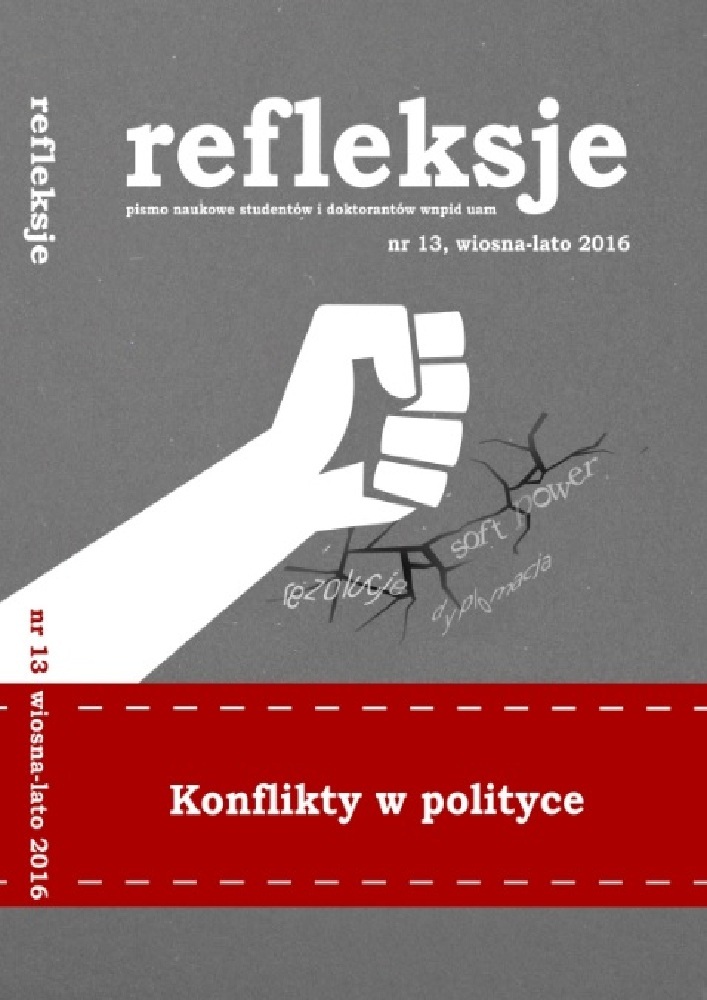Abstrakt
The article carries out a reflection on practical, theoretical and methodological problems faced by social science researchers investigating armed conflicts. Based on Colombia’s ongoing internal war, the paper will discuss the difficulties in data collection (including source selection and information extraction), data sharing and the limitations of exiting theoretical language. It will also exploit other related factors such as the fragmentation of sociological research and the growth of publications regarding the conflict, violence, and the peace processes initiating in Colombia. In the presented article, the author analysis both governmental and non-governmental reports and also outlines several key cultural and political issues affecting data collection and their further publication in Colombia.
Bibliografia
¡BastaYa! Colombia: memorias de guerra y dignidad(2013), Grupo de Memoria Histórica, http://www.centrodememoriahistorica.gov.co/micrositios/informeGeneral/descargas.ht ml, 10.11.2015.
Amnesty International (2008), ‘Leave us in peace!’Targeting civilians in Colombia’s internal armed comflict, Amnesty International Publications.
Ballesteros A., Restrepo J. A., Spagat M., & Vargas J. F. (2006), The work of Amnesty International and Human Rights Watch: Evidence from Colombia, http://www.cerac.org. co/pdf/CERAC_WP_4.pdf, 10.11.2015.
Caballero M.C. (2007), Academic turns city into a social experiment, Harvard Gazzette, http://www.news.harvard.edu/gazette/2004/03.11/01-mockus.html, 10.11.2015.
Camacho G., A., Segura E. N. (1999),A loscuarentaaños de la sociologíaen Colombia, Revista de EstudiosSociales, Vol. 4, 8-10.
Cubides F. (2003), Tendenciasrecientesen la investigación del conflicto y la violenciaen Colombia, [w:]Reflexionessobre la investigaciónencienciassociales y estudios politicos,red.J.
Elster, R. Inglehardt. R. Eislier, Bogotá: Editorial Universidad Nacional de Colombia.
Davenporty Ch., Moore W.H. (2011), Conflict Consortium Standards & Best Practices for Observational Data, http://conflictconsortium.weebly.com/uploads/1/8/3/5/18359923/cc- datastandardspractices7apr2015.pdf, 10.11.2015.
Durkheim E. (2001),Las reglas del métodosociológico, México: Fondo de Cultura Económico.
Gibson J. L., Caldeira G. A., Spence L. K. (2003), Measuring attitudes toward theUnited States Supreme Court, American Journal of Political Science 47(2): 354–367.
Giddens A. (2003), La constitución de la sociedad. Bases para la teoría de la
Estructuración, Argentina: Amorrortu Editores.
Guberek T., Hoover Green A., Roth F. (2011), Using Quantitative Data to Assess Conflict- Related Sexual Violence in Colombia:Challenges and Opportunities, Corporación Punto de Vista.
Hendrix C. (2010), Measuring state capacity: Theoretical and empirical implications for the study of civil conflict.Journal of Peace Research 47(3): 273–285.
Human Rights Watch (2015a), Colombia: un acuerdo que sacrifica la justicia, https://www.hrw.org/es/news/2015/09/28/colombia-un-acuerdo-que-sacrifica-la- justicia, 10.11.2015.
Human Rights Watch (2015b), Colombia: Altos mandosmilitaresvinculados con ejecuciones extra judiciales, https://www.hrw.org/es/news/2015/06/23/colombia-altos-mandos- militares-vinculados-con-ejecuciones-extrajudiciales, 10.11.2015.
Merton R. (1980), Teoría y Estructuras Sociales, México: Fondo de Cultura Económica.
Munck G., Verkuilen J. (2002) Conceptualizing and measuring democracy: Evaluating alternative indices. ComparativePoliticalStudies 35(5): 5–34.
Ministerstwo Spraw Zagranicznych (2015), Kolumbia – ostrzeżenie dla podróżujących, http://www.msz.gov.pl/pl/informacje_konsularne/ostrzezenia/kolumbia___ostrzezenie _dla_podrozujacych, 10.11.2015.
Nasi C., Rettberg A. (2005), Los estudios sobre conflicto armado y paz: un campo en evolución permanente, Colombia Internacional Magazine, Vol. 62, 64-85.
Salehyan I. (2015), Best practices in the collection of conflict data, Vol. 52(1) 105–109.
Sandoval Robayo M. L. (2010), Colombian Sociology in a Context of Violence, Conflict and Terror, Wykład wygłoszonyna XVII Światowym Kongresie Socjologicznym, Goeteborg, 7- 11.07.2010.
Sandoval Robayo M. L. (2014), Investigaciónsociológica y conflicto armadoen Colombia, Revista Colombiana de Sociología Vol. 3 7, No.1, s. 99-120.
Vivanco J. M. (2007), Human Rights Watch response to CERAC charges about our Colombia work, http: //www.hrw.org/sites/default/files/related_material/spagat_response.pdf, 10.11.2015.
